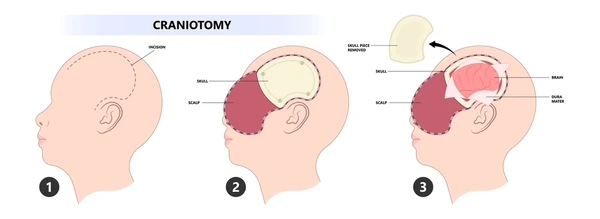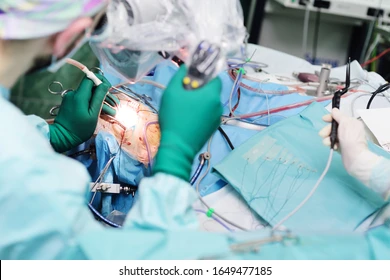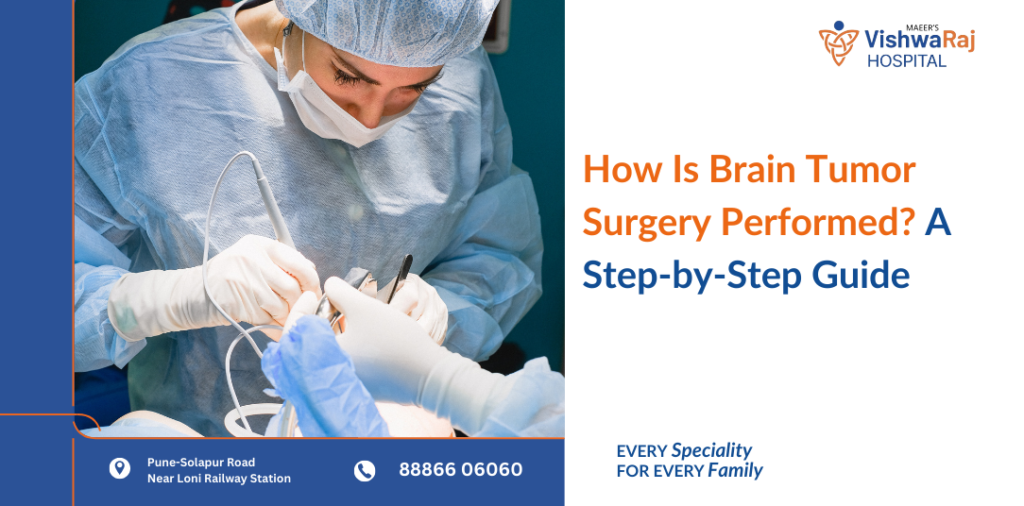A brain tumor is an abnormal cell growth in the brain that can be either benign or malignant. Symptoms vary depending on the tumor’s location and size and may include headaches, seizures, memory loss, and personality changes. Surgery is often the primary treatment to remove or reduce the tumor. Understanding how is brain tumor surgery performed can ease concerns and provide clarity for patients and their families to make informed decisions.
At VishwaRaj Hospital in Pune, our neurosurgical team is equipped with advanced technology and extensive expertise in performing brain tumor surgeries. We provide comprehensive care from diagnosis to post-surgery recovery with a patient-centric approach. Our state-of-the-art facilities and multidisciplinary team ensure each patient receives personalized treatment, enhancing their chances of a successful recovery.
What Is Brain Tumor Surgery and Why Is It Necessary?

Brain tumor surgery is a medical procedure designed to remove or reduce abnormal tissue growth in the brain. It is necessary to:
- Relieve symptoms like headaches, seizures, and neurological
- Prevent further tumor growth.
- Obtain a biopsy for accurate diagnosis.
- Improve the patient’s quality of life.
Surgery is often the first line of treatment, especially for tumors that are accessible and causing significant symptoms.
Feeling anxious about preparing for brain tumor surgery? Let’s delve into the essential steps that can make the process smoother.
How Do You Prepare for Brain Tumor Surgery?
Preparation for brain tumor surgery involves several steps, including:
- Medical Evaluation: Blood tests, imaging scans (MRI or CT), and neurological exams.
- Medication Review: Adjusting current medications to avoid complications.
- Counselling Sessions: Explaining the procedure, risks, and recovery process.
- Fasting: Patients are typically asked to fast for several hours before surgery.
At VishwaRaj Hospital, the medical team ensures patients receive personalized counselling and thorough pre-surgical evaluations to minimize risks and enhance recovery outcomes.
Curious about what happens during a craniotomy? Let’s discuss the detailed steps of this critical brain surgery procedure.
What Does Craniotomy Involve in Brain Tumor Surgery?

- Administering Anesthesia: General anesthesia is given to ensure the patient remains unconscious and pain-free during the surgery.
- Scalp Incision: The surgeon makes an incision in the scalp, typically near the tumor’s location, to expose the underlying skull.
- Bone Flap Removal: A small section of the skull, called the bone flap, is carefully removed to allow access to the brain.
- Tumor Localization: Advanced imaging technologies like MRI or CT scans guide the surgeon to the precise location of the tumor.
- Tumor Removal: The surgeon removes the tumor either completely or partially using microsurgical tools or laser technology.
- Bleeding Control: Surgeons use specialized techniques to control bleeding and minimize damage to surrounding tissues.
- Bone Flap Replacement: The bone flap is repositioned and secured with plates or screws to close the opening.
- Wound Closure: The scalp is sutured, and a sterile bandage is applied to protect the wound.
Curious about how brain tumors are removed while preserving healthy tissue? Explore the cutting-edge techniques used in modern neurosurgery.
How Is a Brain Tumor Removed During Surgery?

The removal of a brain tumor depends on its size, location, and type. The process may involve:
- Microsurgical Techniques: High-powered microscopes allow surgeons to remove small, delicate tumors with enhanced precision.
- Endoscopic Surgery: A thin, flexible tube with a camera is inserted through the nose or a small incision to access and remove tumors in hard-to-reach areas.
- Laser Surgery: High-intensity laser beams target and destroy tumor cells without harming surrounding tissues.
- Neuronavigation Systems: Real-time imaging systems provide detailed maps of the brain to guide the surgeon’s movements with extreme accuracy.
- Ultrasound Aspiration: High-frequency sound waves break down the tumor into smaller fragments, which are then suctioned out.
- Fluorescence-Guided Surgery: Special dyes highlight cancerous cells, making it easier for surgeons to differentiate between healthy and abnormal tissues.
- Biopsy Sampling: A small portion of the tumor may be removed for laboratory analysis to confirm the diagnosis and determine further treatment.
At VishwaRaj Hospital in Pune, cutting-edge technology and highly skilled neurosurgeons ensure the safest and most precise brain tumor removal surgery.
Advanced tumor removal techniques can enhance safety and precision. Speak to an expert to understand the best approach for your condition.
Concerned about the recovery timeline after brain tumor surgery? Discover what to expect and how to speed up the healing process.
How Long Does Recovery After Brain Tumor Surgery Take?

Recovery time varies depending on the complexity of the surgery and the patient’s overall health. The general timeline includes:
- Hospital Stay: Most patients stay in the hospital for 3-7 days post-surgery, during which the medical team closely monitors their vital signs and neurological function.
- Initial Recovery: The first 4-6 weeks require rest, with limited physical activity to allow the brain to heal properly.
- Physical Therapy: Rehabilitation programs begin soon after surgery to help patients regain muscle strength, balance, and coordination.
- Cognitive Rehabilitation: In cases where cognitive functions are affected, speech and occupational therapies are provided to improve memory, language, and problem-solving skills.
- Follow-Up Appointments: Regular consultations with the neurosurgical team monitor progress, address complications, and evaluate the need for further treatments like radiation or chemotherapy.
VishwaRaj Hospital’s rehabilitation team provides personalized recovery plans to help patients regain their quality of life as soon as possible.
Do you know what care is needed after brain tumor surgery? Let’s explore the vital steps to ensure a smooth recovery.
What Post-Surgery Care Is Needed After Brain Tumor Removal?

- Pain Management: Prescribed pain relief medications help manage discomfort effectively without causing dependency.
- Wound Care: Regular cleaning and dressing changes to prevent infections and promote faster healing.
- Seizure Prevention Medication: Anti-epileptic drugs are administered to reduce the risk of seizures, a common complication post-surgery.
- Nutritional Support: Diet plans rich in essential nutrients to boost recovery and maintain overall health.
- Physical and Occupational Therapy: Tailored rehabilitation programs to restore lost motor functions, coordination, and daily living skills.
- Psychological Counseling: Emotional support and mental health services to help patients cope with anxiety, depression, or other emotional challenges.
- Regular Follow-Ups: Scheduled appointments to monitor healing, assess neurological function, and adjust medications if necessary.
Comprehensive post-surgery care ensures a smooth recovery journey. Consult a professional to receive a tailored care plan.
Conclusion
Brain tumor surgery is a life-saving procedure that requires expert medical care and advanced technology. From preparation to post-surgery care, understanding each step empowers patients and their families. At VishwaRaj Hospital, a dedicated team comprising some of the best neurosurgeons in Pune, state-of-the-art equipment, and personalized care plans help patients navigate this challenging journey with confidence and hope.
Frequently Asked Questions
Success rates depend on the tumor type, size, and location but can range from 70-90% for benign tumors.
Not all tumors can be removed completely, especially if they are near critical brain structures.
Risks include infection, bleeding, seizures, or neurological deficits, though these are minimized with advanced surgical techniques.
Depending on the tumor’s location, temporary or permanent memory or speech issues may occur, with rehabilitation helping in recovery.
Following medical advice, attending rehabilitation sessions, and maintaining a positive mindset can improve recovery.
Reference links:
Disclaimer: This page is for informational purposes and not for promotional use.



